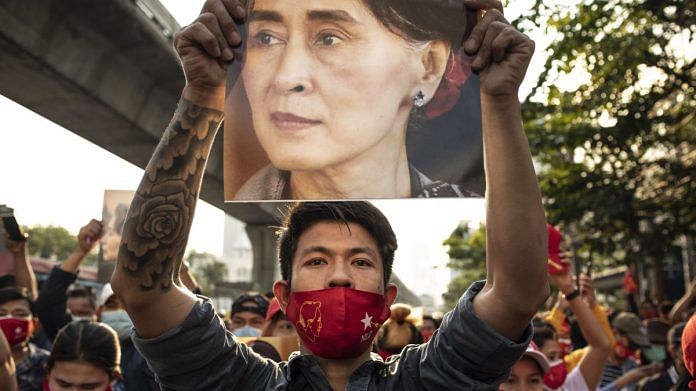Just a few hours before the new Parliament was set to assemble and put forth its candidatures, the roads were swept by military cars and trucks, the press channels were cut off, internet connection suspended, and banks and markets closed. A little later, there was a video broadcast on military-owned television, Myawaddy, stating that a state of emergency has been declared where power has been handed over to the commander-in-chief of the armed forces, Senior General Min Aung Hlaing. While the current move was being anticipated for the past few days; however, the current situation has created alarm among the masses and the world at large.
According to the present statements, the nationwide state of emergency has been declared for one year under Article 417 of the 2008 Constitution. The country’s legislative, administrative and judicial powers have been transferred to the military’s commander-in-chief, in accordance with Article 418 of the charter. In addition, the National League for Democracy (NLD) Party leaders are under detention until further notice.
Evidently this move was taken since the Union Election Commission (UEC) failed to address the voter list irregularities, where the military claims that the elections held on 8 November were rigged. The military maintains it had found more than few million irregularities, which indicated potential voter fraud in all regions. Due to the government’s failure to take steps to resolve the military’s claims of electoral fraud, the NLD’s move to form a new government and convene a new Parliament amounted to an attempt to forcibly seize state power as defined under Section 40(c) and Section 417 of the Constitution.
The constitution of Myanmar, which was drafted in 2008 by the military government, has an enormous role to play behind this move. As per the Constitution, the Commander-in-Chief of the Myanmar Army is the ultimate military authority who can supersede even the President. Interestingly, the Constitution allows the Military Chief “the right to take over and exercise State sovereign power” in case of an emergency or any event. This has been construed to mean any event where he believes that the democratically elected government is not exercising its power in the right accord. The legal machineries framed have bestowed the Military with immense powers without getting prosecuted. This has previously helped the Tatmadaw get away with various coups, including the house arrest of Aung San Suu Kyi and the junta’s renunciation of the 1990 elections.
The current state of affairs has thrown people and other international spectators into utter confusion and fear. During previous coups, the Tatmadaw wiped out institutions, from the judiciary to the education system, which does not support its ideology. If we eye the human rights situation, it is amongst the nastiest in the world. There have been documents of the use of rape as a weapon and the mass recruitment of child soldiers. The Rohingya situation, for instance, is one of the worst which the world is still witnessing.
Moreover, during the few decades of military rule, the country grew to be increasingly alienated from rest of the world. Driven by an obsession with national sovereignty and to seek almost total autonomy from international influences, the country’s foreign policy centered on self-reliance. There was an apparent lack of understanding and need for international assistance. Whether the current situation will repeat a similar trend is yet to be seen.
Also read:12 burning questions about the Myanmar coup answered
There is growing international response to the current event where countries like India, China and Japan, while depicting grave concern, are continuing with their constructive approach whereby they have urged both the parties to enter into a dialogue and resolve the matter peacefully. Inter-governmental organisations such as the United Nations (UN) and ASEAN have demanded dialogue as well. On the other hand, western nations have vehemently condemned the act of the military especially the Biden government, which has threatened sanctions on the perpetrators. Whether such efforts will bring any marked changes in the domestic politics of Myanmar is yet to be seen.
However, much is expected from the people who have voted for the National League for Democracy Party. It is essential that the people, especially youth of Myanmar, like Thailand, will rise to the occasion and protest openly without any fear. It seems very pertinent that for democracy to flourish, growth of democratic institutions and democratic culture is essential. Only such acts will be crucial for turning Myanmar into a resilient democracy. While the military’s political hegemony remains and continues to thrive, it is critical to observe whether any negotiations open between the military and civilian government or if the country does turn back to the dark ages.
Sreeparna Banerjee is a Junior Fellow at ORF Kolkata. She is currently working on Rohingya issue within the Bay of Bengal region under the ‘ORF’s Neigbhourhood Regional Studies Initiative research project. Views are personal.
The article first appeared on the Observer Research Foundation website.







Not that I support this military coup, but is it really necessary to break up society into intellectually appealing groups like youth, student, women, civill society, marginalised, farmers etc? What is wrong if change is lead by middle, rich, male software engineers, for example?